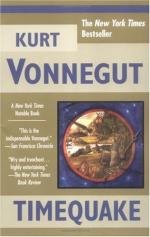|
This section contains 963 words (approx. 4 pages at 300 words per page) |

|
SOURCE: "Vonnegut Stew," in The New York Times, September 28, 1997.
In the following review, Sayers describes Timequake as a mix of novel and memoir.
Like so many of my peers, I began reading Kurt Vonnegut while the Vietnam War was raging. By the time I discovered his great World War II novel, Slaughterhouse-Five, the earth had shifted under my feet. Vonnegut, satirist and tragedian, seemed like a literary elder bearing witness. (Some elder; he was in his 40's then.) And I knew I was embarking on a lifelong relationship. Vonnegut thought the big thoughts—about war and death and how we ought to treat one another—and regarded them not only as transformative but as useful, stylish, even fun. He was not chained to any one idea about "story structure" but was the prankster of italics, exclamation points and one-sentence paragraphs.
He was a word cartoonist, a wise guy...
|
This section contains 963 words (approx. 4 pages at 300 words per page) |

|


